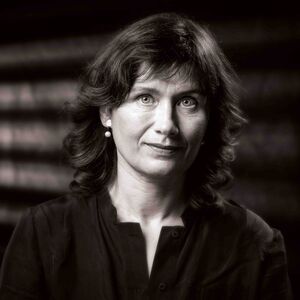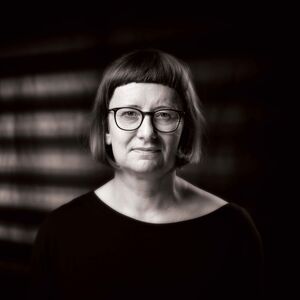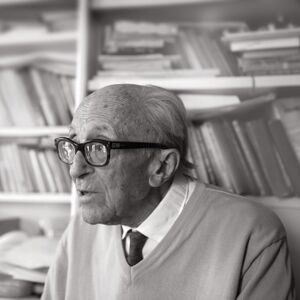-
Anja Štefan

Anja Štefan (1969) is a poet, writer, and storyteller whose poems and fairytales, illustrated by the best Slovene illustrators, address both children and adults. Her work is included in school reading books and anthologies. Plays based on her stories are staged in Slovene puppet theatres. Most notable among her works are Bobek in barčica (Bobby and the Boat) (Mladinska knjiga, 2005), Lonček na pike (A Pot With Spots) (Mladinska knjiga, 2008) and the more recent Zajčkova hišica (Rabbit’s Little House) (Mladinska knjiga, 2021) and Štiri črne mravljice (Four Black Ants) (Mladinska knjiga, 2022). In 2015 an anthology of her work was published, entitled Svet je kakor ringaraja (The World Is Like Ring-a-ring o’ Roses) (Mladinska knjiga, 2015). Last year she was the first Slovene children’s book author to receive the Prešeren Fund Award, Slovenia’s main award in the arts. She is the founder of the Slovene Storytelling Festival, which she ran for 20 years. With her sensitive adaptations she brought numerous folktales to life, published either individually or as more extensive volumes of selected tales. In 2018, the European Year of Cultural Heritage, she was chosen as the ambassador of cultural-artistic education in Slovenia.
-
Barbara Korun

Barbara Korun (1963) was born in Ljubljana where she graduated in comparative literature, and for almost two decades taught at local grammar schools. For several years she worked as a language advisor at the Slovene National Theatre, now she is a freelance writer. Korun has published seven poetry collections and has received several Slovene and international awards. Her first collection won the best debut award, and her fourth collection won the Veronika Award for best Slovene poetry collection of the year and the Golden Bird Award for outstanding achievement in poetry. Her work has been published in fifteen book translations and over sixty reviews and anthologies in more than twenty languages. She also writes reviews and essays and actively promotes poetry written by women. Since 2013, she has organised regular monthly readings of new poetry by Slovene women poets called Women Poets for Women Poets for which she was awarded the 2020 Mira Award bestowed by the Slovene PEN Centre and Italy’s Regina Coppola International Literary Award (2016). Her books include Ostrina miline (The Edge of Grace) (Mladinska knjiga, 1999), Razpoke (Fissures) Nova revija, 2004), Pridem takoj (Back Soon) (KUD Apokalipsa, 2011) and Idioritmija (Idiorrhythmy) (KUD AAC, 2021).
-
Bojana Kunst

Bojana Kunst is a philosopher, dramaturge and performance theorist, a professor at the Institute for Applied Theatre Studies at the Justus Liebig University in Giessen. She was a researcher at the University of Ljubljana and a guest researcher at the University of Antwerp (2002). She was a DAAD guest professor at the University of Hamburg (2009 - 2012). She has lectured and taught seminars, workshops and laboratories in various academic institutions, theatres and artistic organizations across Europe, and has continuously worked with independent artistic initiatives and groups of artists. Her research interests are contemporary performance and dance, art theory and philosophy of contemporary art. She is in the international editorial board of Performance Research and Maska, many of her essays and scientific articles are published in multiple languages (German, English, Korean, Russian, Polish, Danish, Norwegian, Spanish, Portuguese, Serbian, Croatian, etc). Among her last books are: Artist at Work, Proximity of Art and Capitalism, Zero Books, Winchester, London, 2015 (in Slovenian, English, Polish and Danish language) and The Life of Art. Transversal Lines of Care, Ljubljana, 2021 (in Slovenian and German).
-
Boris A. Novak

Boris A. Novak (1953) is a poet, playwright, essayist, translator, Professor at the University of Ljubljana and the Vice-President of International PEN. In the 1990s he organized humanitarian help for refugees from the former Yugoslavia and writers from the besieged city of Sarajevo. He has published 100 books (30 in other languages), among them poetry volumes Mojster nespečnosti (The Master of Insomnia), (Mladinska knjiga, 1995), Alba (Mladinska knjiga, 1999), Obredi slovesa (Rites of Valediction) (Študentska založba, 2005), and Svoboda je glagol (Freedom is a Verb) (Goga, 2022), theatre plays (tragedy Cassandra), poems, fairy tales as well as puppet and radio plays for children. His “Notebooks of Poetic Forms”, Oblike sveta (Forms of the World) (Mladika, 1991), Oblike srca (Forms of the Heart) (Modrijan, 1997), and Oblike duha (Forms of the Spirit) (Mladinska knjiga, 2016) are very popular. His magnum opus is the epic Vrata nepovrata (The Doors of No Return), 45.000 verses on 2.300 pages in three books: Zemljevidi domotožja (Maps of Nostalgia) (Goga, 2014), Čas očetov (The Time of the Fathers) (Goga, 2015) and Bivališča duš (The Dwelling Places of Souls) (Goga, 2017). He translates poetry from ten languages.
-
Boris Pahor

Boris Pahor (1913-2022) is one of the most important Slovenian writers coming from Slovenian minority in Italy, and one of the most translated Slovenian authors. His best-known novel Necropolis, about his life in the Natzweiler-Struthof concentration-camp, has been translated into 18 languages. In many of his works he describes his home town Trieste, the arson of the Slovenian cultural centre Narodni dom and the fight of the Slovenian minority to survive. Till the end of his life he refused any form of fascism – both in written form and in interviews.
Pahor is the recipient of more than 20 Slovenian and international literary and national awards. Among most outstanding are Slovenia's and Italy's highest national honours, the Order of Exceptional Merits of the Republic of Slovenia, and the Knight of the Grand Cross of the Italian Republic, which were awarded to him jointly in July 2020.
Photo: Mladinska knjiga
-
Boštjan Videmšek

Boštjan Videmšek (1975) is a war correspondent who has reported on all major conflicts over the past 25 years. In the last six years, he has focused his work on the consequences of climate change, looking for solutions. His work has been published in The New York Times, Der Spiegel, Stern, Boston Globe, CNN, BBC, Wired, National Geographic, El Figaro, Forbes and Vice, among others. He is the author of eight books on modern conflicts and migration. His book Plan B: pionirji boja s podnebno krizo in prihodnost mobilnosti (Plan B: How Not to Lose Hope in the Times of Climate Crisis) (UMco, 2020; translated into English, Portuguese and Croatian), a book about promising practices in the fight against climate change, was named the 2020 Book of the Year in Slovenia. His latest work of nonfiction, Zadnji dve: Najin in Fatu: reševanje vrste na robu izumrtja (The Last Two: Battle to Save Northern White Rhinos) (UMco, 2022) – which he co-authored with his wife Maja Prijatelj Videmšek – is about to be published in the US by Rowman & Littlefield. His most acclaimed book in English Dispatches from the Frontlines of Humanity (Cambridge Scholars Publishers, 2019). He has just published his first novel Vojni dnevnik (War Diary) (UMco, 2023) and is also the author of two theatre plays.
-
Brane Mozetič

Brane Mozetič (1958) is a poet, writer, translator, editor, publisher, activist, and a promoter of Slovene literature abroad. He has so far published sixteen poetry collections, three novels, among them Zgubljena zgodba (Lost Story) (Aleph, 2001), and a book of short stories. He is also the author of six children’s picture books, among them Prva ljubezen (First Love) (ŠKUC, 2014). Over seventy translations of his books have been published (his poetry collection Banalije (Banalities) (ŠKUC, 2003) alone was translated into thirteen languages). He translates mostly from French and has translated over thirty books. He is editor of the book series Aleph and the LGBT series Lambda, he has also edited a number of anthologies and presentations of Slovene literature abroad. For a number of years he was a leading activist in the gay movement and was for seven years the chief editor of the homoerotic magazine Revolver. He organised a number of international meetings, forums, exhibitions and activities related to AIDS, activist installations, and much more. He also co-organises the annual international music and literature festival Živa književnost (Living Literature) and the LGBT Film Festival, and organises literary tours and poetry translation workshops both at home and abroad.
-
Brane Senegačnik

Brane Senegačnik (1966) is a poet, essayist, translator, editor, and classical philologist. He is currently assistant professor at the Department of Classical Philology in Ljubljana. He has published several translations and critical editions from Greek, Latin and Renaissance literature. In addition to seven books of poetry – Srčni grb (Blazon of the Heart) (Aleph, 1991), Na temnem pragu upa (On the Dark Threshold of Hope) (Družina, 1996), Ptica iz črnih zvezd (Bird, Made of Black Stars) (Družina, 2001), Dvojni čas (Double Time) (Nova revija, 2003), Arie antiche (Družina, 2014), Tišine (Silences) (Celjska Mohorjeva, 2014), Pogovori z nikomer (Conversation with Nobody) (Slovenska matica, 2019) – he authored and co-authored several monographs on different subjects, including on Slovene culture in the so-called transition period and on the ontology of the lyric poem. His poetical texts were set to music by outstanding Slovenian classical composers of various generations. He won the Prešeren Fund Award for poetry (2021) and the Sovre Award for his translation of Seneca' s Oedipus (2012). He is also a literary editor.
-
Cvetka Lipuš

Cvetka Lipuš (1966) was born in Železna Kapla/Bad Eisenkappel in Austria. She studied comparative literature and Slavic Studies in Klagenfurt, and Library and Information Science in Pittsburgh, USA. She co-edited the Carinthian Slovene minority literary magazine Mladje from the early 1990s until 2000. Between 1995 and 2010 she lived in the United States and then moved to Salzburg, Austria. She grew up as a member of the Slovene minority in Austria and writes poetry in Slovene as well as non-fiction in German and English. She has published eight collections of poetry so far, including Spregatev milosti (Conjugating Mercy) (Cankarjeva založba, 2003), Obleganje sreče (Siege of Happiness) (Cankarjeva založba, 2008), Pojdimo vezat kosti (Let's Go Stitch Bones) (Mladinska knjiga, 2010), Kaj smo, ko smo (What We Are When We Are) (Beletrina, 2015), and Odhajanje za začetnike (Leaving for Beginners) (Beletrina, 2021). She has received several fellowships and awards, among others the Government Fellowship for Literature from the Austrian Federal Ministry of Science and Arts, the Acceleration Award for Literature from the State of Carinthia, the Project Fellowships from the Republic of Austria, the Prešeren Fund Award (2016), and the Poetry Award of the State of Carinthia (2020).
-
Drago Jančar

Drago Jančar (1948) was born in Maribor, studied law and worked as a journalist, editor and freelance writer. In the 1980s he lived abroad for some time, including as a Fulbright scholar in the United States in 1985 and in Germany in 1988. One of Slovenia’s most prominent authors, Jančar has been described as a “seismologist of a chaotic history”. His novels and short stories have been translated into 30 languages. His plays have also been performed abroad several times. In 2003 he was awarded the Herder Prize for Literature, in 2007 the Jean Améry Prize for Essays, in 2009 the Hemingway Prize, in 2011 Le Prix Européen de Littérature, in 2014 the Prix du Meilleur livre étranger, and in 2020 the Austrian State Prize for European Literature. He has also recieved the Kresnik Award, Slovenia’s prize for best novel, four times. His works include the novels Ob nastanku sveta (At the Beginning of the World) (Beletrina, 2022), In ljubezen tudi (And Love Itself) (Beletrina, 2017), To noč sem jo videl (I Saw Her that Night) (Modrijan, 2010), Katarina, pav in jezuit (Katarina, the Peacock and the Jesuit) (Slovenska matica, 2000), and the collection of short stories Joyceov učenec (Joyce's Pupil) (Mladinska knjiga, 2008).









 RSS
RSS
